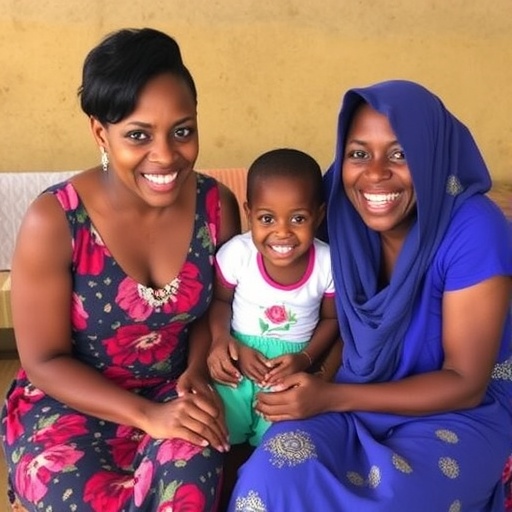A recent study has illuminated the profound challenges faced by caregivers of children with autism spectrum disorder (ASD) in Dar es Salaam, Tanzania. Conducted by a team of researchers led by Saudin, S.N., the investigation highlights the intersection between the quality of life and the responsibilities borne by these caregivers. The findings, to be published in BMC Pediatrics, spotlight a pressing issue that has been overlooked in many parts of the world, particularly in lower-resource settings.
Caregiver stress is a well-documented phenomenon in many contexts, but the nuances of this experience in specific cultural and economic environments warrant deeper exploration. Many caregivers often report feelings of isolation and burnout, stemming from the multifaceted nature of their responsibilities. The study’s authors aimed to assess the quality of life among these caregivers, acknowledging the unique challenges faced in urban settings like Dar es Salaam where formal support systems may be limited or nonexistent.
The methodology adopted in this study was both comprehensive and culturally sensitive. Researchers employed a mixed-methods approach, combining quantitative data through surveys and qualitative insights through interviews. This dual approach allowed a more nuanced understanding of the caregivers’ experiences, providing a richer perspective on how their roles shape both their personal well-being and familial dynamics. Survey participants were meticulously selected, reflecting a diverse demographic that included varying socioeconomic backgrounds.
Caregivers reported that their lives were significantly impacted in numerous ways, from emotional turmoil to physical health challenges. Many described a constant state of vigilance, remaining attuned to the needs of their children, which often leaves little time for self-care. As one caregiver poignantly put it, “Every day is a balancing act; it’s hard to prioritize my well-being when my child’s needs are so demanding.” This sentiment echoed through many shared experiences, revealing a stark and often painful reality.
The emotional toll on caregivers is particularly concerning. The study found that a significant proportion of respondents displayed symptoms related to depression and anxiety, illustrating the extensive emotional burden they carry. The stigma surrounding disability in many societies compounds these feelings, as caregivers often feel judged or unsupported by their communities. Such societal pressures can exacerbate the already complex emotional landscape that caregivers navigate daily.
Economically, caregivers also face numerous hurdles. Many reported having to limit work hours or forgo employment entirely to provide necessary care. This financial strain not only impacts the caregivers’ quality of life but can also translate to reduced resources available for the child with ASD. The study underscores the need for policy interventions that support families in managing these dual responsibilities, such as flexible working conditions and financial assistance.
Interestingly, the research also revealed that despite the numerous challenges, some caregivers reported a profound sense of fulfillment and pride in their roles. They cited their children’s milestones, regardless of how small, as significant achievements that brought joy and meaning to their lives. This duality of experience—pain intertwined with pride—was a recurring theme in the interviews conducted.
Cultural perceptions of autism also play a significant role in shaping caregiver experiences. In many cases, caregivers indicated that societal misconceptions regarding autism lead to further isolation. The matter of how autism is viewed—ranging from being seen as a moral failing to a medical issue—changes the landscape of support available, or lack thereof. The authors of the study argue for increased awareness and education surrounding autism within the Tanzanian context to foster a more supportive environment for families.
In addition, the role of community support emerged as a critical factor in influencing caregivers’ quality of life. Some participants reported positive experiences when connecting with other caregivers or support groups, highlighting the importance of solidarity in navigating similar struggles. Sharing experiences, resources, and emotional support can be invaluable for those feeling overwhelmed, creating a network that mitigates feelings of isolation.
As the study progresses towards publication, the implications of the findings are becoming clear. For stakeholders in health care and social services, the research serves as a clarion call to better understand and address the needs of caregivers. By amplifying their voices and experiences, there is an opportunity to inform policies that are not only inclusive but also responsive to the real-world complexities faced by these families.
Researchers hope that their work will inspire further studies and discussions on the quality of life for caregivers, particularly in low-resource settings. While autism spectrum disorder is a global issue, the ways in which it impacts families can differ greatly. A contextual understanding, as provided by this study, is imperative for crafting effective interventions.
In conclusion, the landscape of caregiving in Dar es Salaam for children with autism spectrum disorder is fraught with complexity but also brimming with potential. As more studies like this emerge, there lies hope for a future where caregivers receive the support and appreciation they so rightly deserve. The journey from awareness to action is long, but through collective efforts, we can begin to transform the narrative surrounding autism and those who nurture it.
Subject of Research: Quality of life among caregivers of children and adolescents with autism spectrum disorder in Dar es Salaam, Tanzania.
Article Title: Quality of life among caregivers of children and adolescents with autism spectrum disorder in Dar es Salaam, Tanzania.
Article References:
Saudin, S.N., Abdulshakoor, A., Ngowi, A. et al. Quality of life among caregivers of children and adolescents with autism spectrum disorder in Dar es Salaam, Tanzania. BMC Pediatr 25, 776 (2025). https://doi.org/10.1186/s12887-025-06154-x
Image Credits: AI Generated
DOI: https://doi.org/10.1186/s12887-025-06154-x
Keywords: autism spectrum disorder, caregivers, quality of life, Dar es Salaam, Tanzania, mental health, economic impact, community support.
Tags: autism spectrum disorder in Dar es Salaamburnout among autism caregiverscaregiver responsibilities and well-beingcaregiver stress in low-resource settingscaregivers of children with autismchallenges faced by caregivers in Tanzaniacultural impact on caregiver experiencesisolation experienced by caregiversmental health of caregivers in urban settingsmixed-methods research in healthcarequality of life for ASD caregiverssupport systems for ASD families





